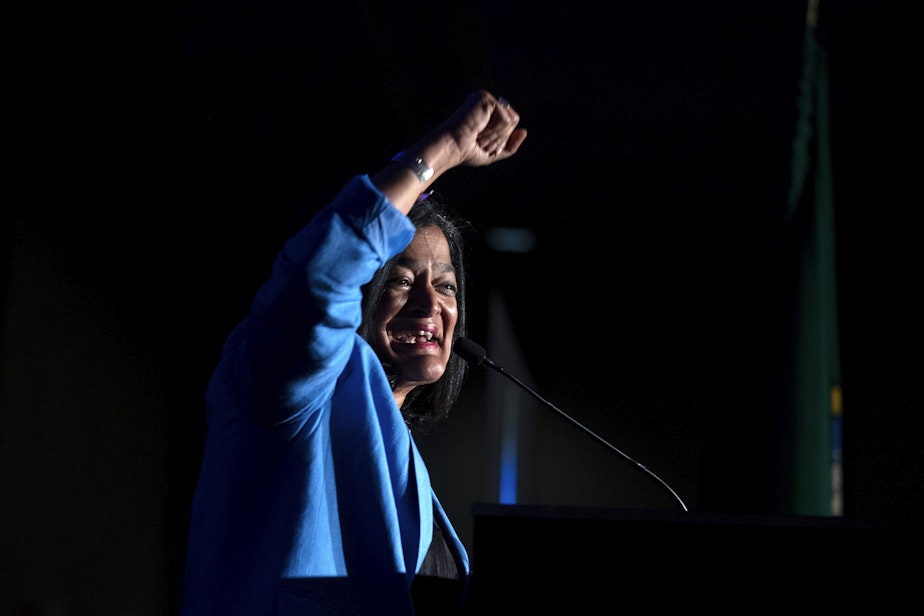Jayapal reintroduces Transgender Bill of Rights

U.S. Rep. Pramila Jayapal (D-Seattle) is once again trying to codify federal protections for transgender and gender non-conforming people across the country.
This is her second effort to get a Transgender Bill of Rights adopted.
Even though Jayapal has the support of dozens of lawmakers, her bill still faces an uncertain path forward in the current Congress.
"But I think that this is an important moment to put out there the vision of what equality and equity and justices looks like for our transgender community, especially given the nasty attacks, the cruel attacks from too many Republicans in Congress," Jayapal told KUOW's Paige Browning. "So, the road is... make sure we can get it to a point when, in two years when Democrats take back the [House], we can pass it."
In planning for the bill's future passage, Jayapal acknowledged its chances are slim today.
The Transgender Bill of Rights seeks to:
- Amend the Civil Rights Act of 1964 to explicitly include gender identity and sex characteristics as protected characteristics.
- Amend federal education laws to explicitly protect students from discrimination based on gender identity and sex characteristics.
- Make it illegal to discriminate in employment, housing and credit based on gender identity and sex characteristics.
- Invest in community services to prevent violence against transgender and nonbinary people and expand services for survivors. This would include banning so-called "conversion therapy" practices.
- Require the attorney general to designate a liaison within the Civil Rights Division of the Department of Justice dedicated to advising and overseeing enforcement of the civil rights of transgender people.
In addition to these core goals, which represent a difficult political battle ahead, Jayapal also wants to address bodily autonomy and medical care. The bill would:
Sponsored
- Expand access to gender-affirming medical care.
- Protect transgender people from discrimination in health care settings.
- Ban forced surgery on intersex children and infants.
- Codify the right to abortion and contraception.
The latter, a federal right to abortion, is almost certainly a nonstarter all on its own. Still, Jayapal said the bill must recognize the right to bodily autonomy and ethical health care.
"That's really the purpose here," she said, "to recognize that the right to abortion applies to everybody."
The matter of transgender rights is personal for Jayapal.
She has a transgender daughter through whom Jayapal has witnessed the process trans youth go through to "be able to fully express themselves, fully be who they are."
Sponsored
In 2019, Jayapal gave a passionate speech on the House floor about learning her child was then nonbinary.
"My beautiful, now 22-year-old child told me last year that they were gender nonconforming,” she said at the time. “The only thought I wake up with every day is: my child is free. My child is free to be who they are."
KUOW's Paige Browning asked Jayapal whether she feels her child is still free to be who they are today.
Jayapal noted transgender people in the U.S. are four times more likely than cisgender people to be victims of violent crime, including rape, sexual assault and aggravated or simple assault, according to a study by the Williams Institute at UCLA School of Law. That study also found that about half of all violent victimizations were not reported to police.
Additionally, according to a study of suicidality among transgender youth, 82% of transgender people have considered suicide and 40% have attempted suicide.
Sponsored
Jayapal said people like her daughter face hate in much of the country, making it more difficult to be "free."
"I think that there's a feeling of freedom for trans folks and LGBT and nonbinary communities when they're able to be who they are. But there are such attacks on that very identity and so much fear from our trans community," she said. "The beauty of this is that this doesn't hurt anybody, for people to be fully who they are... People's identities do not affect anybody else. These are still our children. These are still our siblings. These are still people across the country that are in our communities every day. And we should just be welcoming and allow them to be fully who they are."





